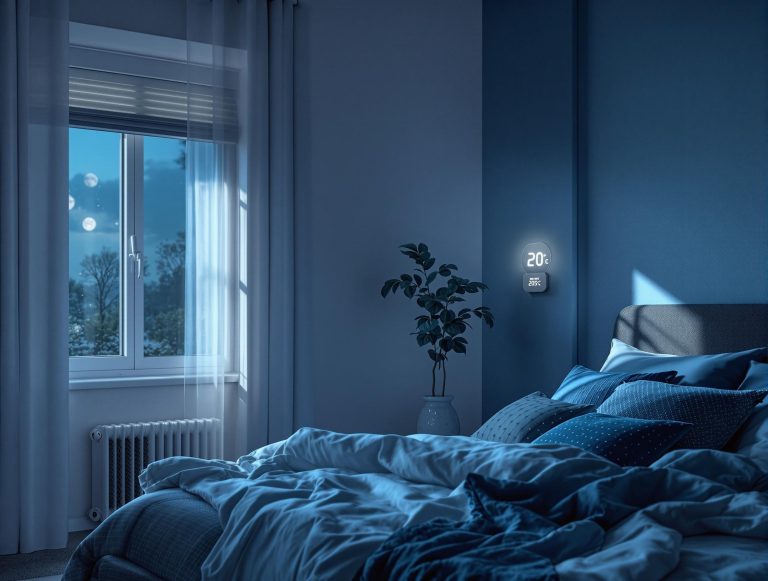The Importance of Sleep: How to Improve Sleep Quality
Introduction
In today’s fast-paced world, sleep often takes a backseat to our busy schedules and endless to-do lists. Yet, sleep is one of the most critical components of overall health and well-being. Quality sleep is not just about feeling rested; it plays a vital role in maintaining physical health, mental clarity, and emotional stability. Unfortunately, many people struggle with sleep-related issues that can significantly impact their daily lives. From difficulty falling asleep to waking up feeling unrefreshed, poor sleep can affect every aspect of our lives.
In this blog post, we’ll explore the science behind sleep, its numerous benefits, common sleep disorders, and practical tips to help you improve your sleep quality. Whether you’re dealing with insomnia, restless nights, or simply want to enhance your sleep habits, this guide will provide you with the knowledge and tools to achieve a restful night’s sleep and wake up feeling rejuvenated.
Section 1: The Science of Sleep
Understanding the science behind sleep can help us appreciate its crucial role in our lives. Sleep is a complex and dynamic process that involves multiple stages, each serving a unique function for our bodies and minds.
The Sleep Cycle
Sleep is divided into two main types: Rapid Eye Movement (REM) sleep and Non-Rapid Eye Movement (non-REM) sleep. Together, these form a complete sleep cycle, which typically lasts about 90 minutes and repeats several times throughout the night.
Non-REM Sleep: This type of sleep consists of three stages:
- Stage 1: This is the lightest stage of sleep, where you drift in and out of sleep and can be easily awakened. Your muscles relax, and your heartbeat, breathing, and eye movements begin to slow.
- Stage 2: In this stage, you enter a more stable sleep. Your body temperature drops, and eye movements stop. Brain wave activity slows, but there are brief bursts of electrical activity.
- Stage 3: This is the deepest and most restorative stage of non-REM sleep. It’s difficult to wake up during this stage, and if you do, you may feel disoriented. This stage is crucial for physical restoration, growth, and immune system strengthening.
REM Sleep: REM sleep usually occurs about 90 minutes after falling asleep. During this stage, your brain becomes more active, and you experience vivid dreams. Your eyes move rapidly from side to side, and your heart rate and breathing speed up. REM sleep is essential for cognitive functions such as memory consolidation, learning, and emotional regulation.
Recommended Sleep Duration
The amount of sleep needed varies by age and individual factors. Here are general recommendations for different age groups:
- Newborns (0-3 months): 14-17 hours per day
- Infants (4-11 months): 12-15 hours per day
- Toddlers (1-2 years): 11-14 hours per day
- Preschoolers (3-5 years): 10-13 hours per day
- School-Age Children (6-13 years): 9-11 hours per day
- Teenagers (14-17 years): 8-10 hours per day
- Young Adults (18-25 years): 7-9 hours per day
- Adults (26-64 years): 7-9 hours per day
- Older Adults (65+ years): 7-8 hours per day
By understanding the sleep cycle and knowing how much sleep is necessary, you can better appreciate the importance of good sleep hygiene and its impact on your overall health.
Section 2: The Benefits of Good Sleep
Good sleep is a cornerstone of overall health and well-being, impacting nearly every aspect of our lives. Here are some of the key benefits of achieving quality sleep:
Physical Health Benefits
- Immune System Support: Adequate sleep strengthens the immune system, helping your body fight off infections and illnesses more effectively.
- Heart Health: Consistent, good-quality sleep can reduce the risk of heart disease, high blood pressure, and stroke by helping to regulate blood pressure and inflammation.
- Weight Management: Sleep influences the hormones that control hunger and appetite. Getting enough sleep helps regulate these hormones, reducing the risk of overeating and weight gain.
- Tissue Repair and Growth: During deep sleep, your body repairs and regenerates tissues, builds muscle, and strengthens bones, contributing to overall physical recovery and growth.
Mental Health Benefits
- Improved Mood: Good sleep is essential for emotional regulation. Adequate rest helps reduce stress, anxiety, and depression, leading to a more stable and positive mood.
- Enhanced Cognitive Function: Sleep is critical for brain health. It supports memory consolidation, learning, problem-solving, and decision-making skills.
- Stress Reduction: Quality sleep helps manage the body’s stress response, reducing the levels of cortisol, the stress hormone, and promoting a sense of calm and relaxation.
Performance Benefits
- Better Concentration: Good sleep improves focus, attention, and the ability to concentrate on tasks, which is crucial for productivity at work or school.
- Enhanced Productivity: With sufficient rest, you can work more efficiently and effectively, making fewer mistakes and maintaining higher levels of performance.
- Athletic Performance: Athletes and physically active individuals benefit from quality sleep as it enhances coordination, reaction times, and overall physical performance. Recovery times are shorter, and the risk of injuries decreases.
Long-Term Health Benefits
- Reduced Risk of Chronic Diseases: Regular, quality sleep can lower the risk of developing chronic conditions such as diabetes, hypertension, cardiovascular disease, and certain cancers.
- Longevity: Consistently good sleep is linked to a longer lifespan, as it helps maintain overall health and prevents the premature onset of age-related diseases.
Understanding these benefits underscores the importance of prioritizing good sleep as a fundamental aspect of your health routine. By aiming for the recommended amount of sleep and adopting habits that promote quality rest, you can enhance your physical, mental, and emotional well-being, leading to a more balanced and fulfilling life.
Section 3: Common Sleep Disorders
Sleep disorders can significantly disrupt your sleep quality and overall well-being. Understanding these disorders, their symptoms, causes, and potential treatments can help you recognize when to seek professional help.
Insomnia
Symptoms:
- Difficulty falling asleep
- Waking up frequently during the night
- Waking up too early and unable to go back to sleep
- Daytime fatigue or sleepiness
- Irritability, depression, or anxiety
- Difficulty concentrating or remembering
Causes:
- Stress and anxiety
- Poor sleep habits
- Medical conditions (e.g., arthritis, asthma)
- Medications
- Caffeine, nicotine, and alcohol
Treatments:
- Cognitive Behavioral Therapy for Insomnia (CBT-I)
- Medications (prescription and over-the-counter)
- Relaxation techniques and improved sleep hygiene
Sleep Apnea
Symptoms:
- Loud snoring
- Episodes of stopped breathing during sleep
- Gasping for air during sleep
- Morning headache
- Daytime sleepiness
- Difficulty paying attention
Causes:
- Obstructed airway due to throat muscles relaxing
- Obesity
- Anatomical factors (e.g., large tonsils, small airway)
- Smoking
- Family history
Treatments:
- Continuous Positive Airway Pressure (CPAP) therapy
- Oral appliances
- Lifestyle changes (weight loss, quitting smoking)
- Surgery (in severe cases)
Restless Leg Syndrome (RLS)
Symptoms:
- Unpleasant sensations in the legs (e.g., tingling, crawling)
- An irresistible urge to move the legs
- Symptoms worsen during periods of inactivity
- Symptoms improve with movement
- Difficulty falling and staying asleep
Causes:
- Genetics
- Iron deficiency
- Chronic diseases (e.g., Parkinson’s disease, diabetes)
- Medications
- Pregnancy
Treatments:
- Iron supplements (if deficiency is identified)
- Medications to reduce symptoms
- Lifestyle changes (regular exercise, avoiding caffeine)
Narcolepsy
Symptoms:
- Excessive daytime sleepiness
- Sudden loss of muscle tone (cataplexy)
- Sleep paralysis
- Hallucinations
- Fragmented nighttime sleep
Causes:
- Loss of hypocretin (a brain chemical that regulates wakefulness)
- Genetics
- Autoimmune disorders
- Brain injuries
Treatments:
- Medications (stimulants, antidepressants)
- Scheduled naps
- Good sleep hygiene practices
By recognizing the symptoms and understanding the causes of these common sleep disorders, you can take the necessary steps to improve your sleep quality. If you suspect you have a sleep disorder, it’s important to consult a healthcare provider for an accurate diagnosis and appropriate treatment.
Section 4: Factors Affecting Sleep Quality
Many factors can impact the quality of your sleep, ranging from lifestyle habits to environmental conditions. Understanding these factors can help you identify and modify behaviors that may be interfering with your ability to get a good night’s rest.
Lifestyle Factors
- Diet: What you eat and drink can significantly affect your sleep. Caffeine and nicotine are stimulants that can keep you awake. Alcohol, although it might make you feel sleepy initially, can disrupt your sleep cycle later in the night. Eating heavy or spicy meals too close to bedtime can also cause discomfort and interfere with sleep.
- Exercise: Regular physical activity can promote better sleep. However, exercising too close to bedtime can have the opposite effect, making it harder to fall asleep due to increased adrenaline levels.
- Stress Levels: High stress and anxiety can keep your mind active at night, making it difficult to fall asleep. Managing stress through relaxation techniques, such as meditation, deep breathing, or yoga, can improve sleep quality.
Environmental Factors
- Light: Exposure to light, especially blue light from screens, can interfere with your body’s production of melatonin, the hormone that regulates sleep. Aim to reduce screen time before bed and create a dark, dimly lit environment for sleeping.
- Noise: Background noise can disrupt sleep, even if you don’t fully wake up. Consider using earplugs, white noise machines, or calming music to block out disruptive sounds.
- Room Temperature: A cool, comfortable room temperature is conducive to better sleep. The ideal temperature for most people is between 60-67°F (15-19°C).
Technology
- Screen Time: The blue light emitted by phones, tablets, and computers can delay the release of melatonin, making it harder to fall asleep. Try to limit screen use for at least an hour before bedtime.
- Electronic Devices: The presence of electronic devices in the bedroom can be a source of distraction and disruption. Keeping devices out of the bedroom or turning them off can help create a more restful environment.
Medical Conditions
- Chronic Pain: Conditions like arthritis, back pain, and fibromyalgia can make it difficult to find a comfortable sleeping position, leading to fragmented sleep.
- Medications: Certain medications, such as those for asthma, allergies, or high blood pressure, can interfere with sleep. If you suspect your medication is affecting your sleep, consult your healthcare provider for alternatives or adjustments.
- Sleep Disorders: Conditions like sleep apnea, restless leg syndrome, and insomnia directly impact sleep quality. If you experience symptoms of a sleep disorder, seeking medical advice is crucial for proper diagnosis and treatment.
By recognizing and addressing these factors, you can create an environment and lifestyle that promotes better sleep quality. Small changes in your daily habits and sleep environment can lead to significant improvements in how well you sleep and, consequently, how well you feel and function during the day.
Section 5: Tips for Improving Sleep Quality
Improving your sleep quality involves making adjustments to your daily habits, bedtime routine, and sleep environment. Here are some practical tips to help you achieve better sleep:
Establish a Regular Sleep Schedule
- Consistent Bedtime and Wake Time: Go to bed and wake up at the same time every day, even on weekends. This helps regulate your body’s internal clock and can improve the quality of your sleep.
- Gradual Adjustments: If you need to change your sleep schedule, make small adjustments of 15 minutes earlier or later each day until you reach your desired schedule.
Create a Relaxing Bedtime Routine
- Wind Down: Engage in calming activities before bed, such as reading a book, taking a warm bath, or practicing gentle yoga or meditation.
- Avoid Stimulants: Steer clear of caffeine, nicotine, and large meals at least a few hours before bedtime. Instead, opt for a light snack if you’re hungry.
- Limit Screen Time: Reduce exposure to screens from phones, tablets, and computers at least an hour before bedtime to minimize blue light disruption.
Optimize Your Sleep Environment
- Comfortable Bedding: Invest in a good quality mattress and pillows that support your body and suit your sleep preferences. Comfortable bedding can make a significant difference in sleep quality.
- Dark and Quiet: Make your bedroom as dark as possible using blackout curtains or a sleep mask. Use earplugs or a white noise machine to block out disruptive sounds.
- Cool Temperature: Keep your bedroom cool, ideally between 60-67°F (15-19°C), to create a comfortable sleep environment.
Limit Exposure to Screens Before Bedtime
- Blue Light Reduction: Use apps or settings on your devices to reduce blue light emission in the evening. Better yet, turn off electronic devices an hour before bed.
- Alternative Activities: Engage in activities that don’t involve screens, such as reading a physical book, journaling, or doing a puzzle.
Watch Your Diet
- Avoid Stimulants: Limit consumption of caffeine and nicotine, especially in the afternoon and evening, as they can interfere with your ability to fall asleep.
- Healthy Eating Habits: Eat a balanced diet with regular meals to maintain stable energy levels throughout the day. Avoid heavy, rich, or spicy foods before bedtime.
Exercise Regularly
- Timing Matters: Regular physical activity can promote better sleep but try to finish exercising at least a few hours before bedtime to allow your body to wind down.
- Type of Exercise: Engage in moderate aerobic exercises, such as walking, swimming, or cycling, which can help you fall asleep faster and enjoy deeper sleep.
Manage Stress and Anxiety
- Relaxation Techniques: Practice stress-reducing activities such as deep breathing, progressive muscle relaxation, or mindfulness meditation before bed.
- Journaling: Write down your thoughts and worries before bedtime to clear your mind and prevent overthinking during the night.
By incorporating these tips into your daily routine, you can create a sleep-friendly environment and establish habits that promote restful and rejuvenating sleep. Consistency is key, so make these changes gradually and stick with them to see the best results.
Section 6: When to Seek Professional Help
While lifestyle changes and improved sleep hygiene can significantly enhance sleep quality, some sleep issues may require professional intervention. Knowing when to seek help from a healthcare provider is crucial for addressing underlying problems and obtaining appropriate treatment.
Signs That You Might Need to Consult a Healthcare Provider
- Persistent Insomnia: If you have difficulty falling asleep or staying asleep for more than a few weeks, despite practicing good sleep hygiene, it may be time to seek professional help.
- Daytime Sleepiness: Excessive daytime sleepiness, frequent napping, or falling asleep during activities such as driving or working indicates a potential sleep disorder.
- Loud Snoring and Breathing Issues: Loud snoring, gasping for air, or observed episodes of stopped breathing during sleep can be signs of sleep apnea, which requires medical evaluation.
- Unusual Sleep Behaviors: Experiencing sleepwalking, night terrors, or other unusual behaviors during sleep may indicate a parasomnia, which needs medical attention.
- Restless Legs: If you have an irresistible urge to move your legs, especially at night, or experience uncomfortable sensations that disturb your sleep, you may have Restless Leg Syndrome (RLS).
- Mood and Cognitive Changes: Chronic sleep issues can lead to mood disturbances, such as irritability, depression, and anxiety, as well as cognitive problems like memory loss and difficulty concentrating. Professional help can address these symptoms and their root causes.
Overview of Potential Treatments and Therapies
- Cognitive Behavioral Therapy for Insomnia (CBT-I): This evidence-based therapy helps change thoughts and behaviors that negatively affect sleep. It’s often recommended as the first line of treatment for chronic insomnia.
- Medications: Depending on the sleep disorder, your healthcare provider may prescribe medications to help manage symptoms. This can include sleep aids for insomnia, continuous positive airway pressure (CPAP) for sleep apnea, or medications for RLS and narcolepsy.
- Sleep Studies: In cases of suspected sleep disorders such as sleep apnea or narcolepsy, your doctor may recommend a sleep study (polysomnography) to monitor your sleep patterns and diagnose the condition accurately.
- Specialist Referrals: Your primary care provider may refer you to a sleep specialist, neurologist, or mental health professional for further evaluation and treatment of complex sleep disorders.
- Lifestyle and Behavioral Changes: Healthcare providers can offer personalized advice on lifestyle modifications, stress management techniques, and other behavioral changes to improve sleep.
Importance of a Comprehensive Approach
Addressing sleep issues often requires a multifaceted approach that considers both medical and behavioral aspects. Collaboration with healthcare providers ensures a thorough evaluation and the development of a personalized treatment plan tailored to your specific needs.
By recognizing the signs that indicate the need for professional help and understanding the available treatment options, you can take proactive steps toward better sleep health. Don’t hesitate to reach out to a healthcare provider if you’re experiencing persistent sleep problems, as early intervention can lead to more effective management and improved quality of life.
Conclusion
Quality sleep is fundamental to overall health and well-being, impacting everything from physical health and mental clarity to emotional stability and daily performance. By understanding the science of sleep, recognizing the benefits of good sleep, identifying common sleep disorders, and addressing the factors that affect sleep quality, you can take meaningful steps to improve your sleep habits.
Implementing the practical tips provided, such as establishing a regular sleep schedule, creating a relaxing bedtime routine, optimizing your sleep environment, and managing stress, can significantly enhance your sleep quality. However, if you experience persistent sleep issues, it’s important to seek professional help to address underlying problems and receive appropriate treatment.
Prioritizing sleep is not just about feeling rested; it’s about investing in your long-term health and well-being. By making sleep a priority, you can enjoy a more balanced, energetic, and fulfilling life. If you have any questions or need further assistance with your sleep concerns, don’t hesitate to reach out to Care& for support. Together, we can help you achieve the restful, restorative sleep you deserve.







